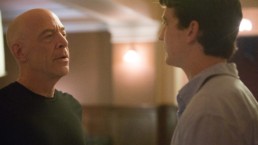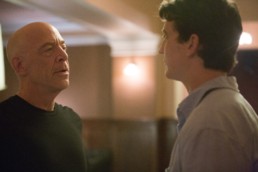Miles Teller, J.K. Simmons, and Damien Chazelle on ‘Whiplash’
"I have not read a script that has demanded so much from a character. I was happy that Damien had me in mind for the role. This is a movie that’s almost shot like a boxing movie." -Miles Teller
Whiplash is a film that’s been buzzing since it snagged both the Grand Jury Prize and Audience Award in the drama category earlier this year at Sundance. It is filmmaker Damien Chazelle’s debut feature film and quite a remarkable work that will easily make its way into the canon of brilliant films depicting musicians. While the relationship between the lead characters of the film, a jazz student drummer and his demanding music teacher, is as tense as can be, costars Miles Teller and J. K. Simmons could barely mask their real life friendship as they bantered back and forth throughout the interview. Simmons could barely answer a single question without playfully poking fun at Teller, resulting in endless laughs from the press. We begin:
DO YOU THINK ARTISTS ACTUALLY WANT THE KIND OF PRESSURE THAT TERRENCE FLETCHER PUTS ON ANDREW?
J.K. Simmons: (to Teller) What do you think, bitch?
[Laughs]
Miles Teller: For me, the greatest success that I’ve had on any project comes through collaboration. I wouldn’t want to do a movie where after everything I do, the director just says ‘good job.’ At the same time, I’ve been on movies where I wasn’t able to do the stuff I wanted to. It’s a fine line, but at the end of the day, I do need somebody to oversee what I’m doing. I like directors that will inspire me and give me ideas.
J.K.S: God, he goes on, doesn’t he?
[Laughs]
J.K.S: But to answer your question: God, I hope not. Masochists, I guess. I agree with the benefits of being pushed and directed, but that kind of manipulation and abuse has no place in life.
MILES, YOUR PUT YOUR BLOOD, SWEAT, AND TEARS INTO THIS ROLE. CAN YOU GO INTO THE DETAILS OF THIS PROCESS A LITTLE? IS WHAT WE HEAR ALL YOU ON THE DRUMS, OR WAS THE SOUND SWEETENED IN POST-PRODUCTION?
MT: I hope it was sweetened a little bit, because at the end of day, Andrew is a much better drummer than I am. But I have a pretty good skill set. When I read the script, there’s all this talk of blood splattering on the drums. I thought it was too much, but Damien said to me, ‘When I played, all my drumsticks were covered in blood. This is truthful.’ I got real blood blisters and we bandaged them up. Filming a movie like this in 19 days with intense drum sequences, a lot of that sweat is real. And that’s great because you don’t have to act when you’re actually playing to exhaustion. I remember J.K. told me to hold back, he said, ‘We’re gonna have a couple takes, you should save some.’ So a lot of it was life imitating art.
Damien Chazelle: We did a lot of work in the editing room. But a lot of [the drumming] is either raw stuff on set or pre recordings. But everything you see in the movie, pretty much, is Miles.
HOW MUCH REHEARSAL PREP WAS THERE? HOW MANY TAKES DID YOU NEED WHEN YOU SHOT THAT?
DC: With this kind of schedule, we didn’t have that many takes at our disposal. We also didn’t have time to rehearse. Everything was very short changed, and you worry about that in the moment. But when you have [actors] like this, they brought it everyday. There’s a lot of stuff in the movie we knew we had to get in one or two takes. The scene where J.K. circles through the three drummers was done as a single take multiple times. We did probably 12-15 takes of that, and it’s about a 5 minute scene, I think Miles was pretty pissed by the end.
[Laughs]
FOR MILES AND J.K., WHAT DID YOU DRAW UPON FOR INSPIRATION TO CREATE THESE AMAZING CHARACTERS?
J.K.S: There was no conscience role model I used. It was all there on the page. I understood it and I knew I was the guy to lift it off the page. Miles and I really settled into a rhythm and had a good time.
MT: Same thing for me, people asked me if I asked Damien for advice, since it was autobiographical, but not really. I asked him a few technical drumming questions, but it was very clear on the page what Andrew was all about. Andrew wants to be the greatest drummer of all time.
“Even as a script, there were different reactions. People who hadn’t been in this world, the immediate thought was: it can’t be like this. But when I showed it to drummers, they thought it didn’t go far enough. They thought it should be worse. There’s a whole side to this world people don’t know about.” -Damien Chazelle (Director)
THE END OF THIS MOVIE IS SO REMARKABLY CATHARTIC. HOW EAGER ARE YOU TO SORT OF ROMANTICIZE THE NOTION OF BEING SUBJECTED TO SOMETHING THAT YOU NOT ONLY SURVIVE BUT ARE ABLE TO REACH ANOTHER ARTISTIC LEVEL?
DC: It’s tough because the movie operates on the screen way differently than it did on the page. When [I was] writing it, in my mind it was a more tragic ending than victorious. Almost like someone gladly returning to an abusive relationship. But on the screen, you film a great drum solo to that type of music and it does something. My hope through the scene was to give you a kinetic rush but leave you with a question that makes that rush a little more troubling.
I KNOW IN THE DRUM-CORE WORLD, WE HAD INSTRUCTORS WORSE THAN YOU, J.K., AND IT MADE US BETTER DRUMMERS. DAMIEN, HOW IMPORTANT WAS IT TO CONVEY THAT?
DC: Even as a script, there were different reactions. People who hadn’t been in this world, the immediate thought was: it can’t be like this. But when I showed it to drummers, they thought it didn’t go far enough. They thought it should be worse. There’s a whole side to this world people don’t know about. A lot of music movies fit into a certain mold, but it was important that this movie showcased things that hadn’t been seen before. I had a teacher like J.K., and it made me a better drummer. But as a humanist, I can’t condone what he does. I wanted to make the character as monstrous as possible. But there’s this streak of tyranny leading to great musicianship in jazz history.
J.K.S: When I met Miles, I wanted to go farther.
MT: Bring it on, bitch.
[Laughs]
J.K.S: Damien and I have similar philosophies there. I love that this movie inspires debate. How far is too far? This kind of relentless abuse might be necessary if you’re training navy seals, but I don’t know if it’s appropriate in music school. But it’s there, and it can be productive, there’s no denying it. But I would rather have a pretty girlfriend than make my hands bleed all the time.
DAMIEN, WERE YOU NERVOUS FOR THE PREMIERE AT SUNDANCE?
DC: Movie screenings remind me of being a drummer on stage. It’s my new form of stage fright. Except you have no control over it. We were opening night at Sundance, it felt like a tough spot. But it was great. It was a fun week of sleeplessness.
MILES, IN TERMS OF HOW IMPORTANT “CARAVAN” [A PRESTIGIOUS JAZZ ENSEMBLE] WAS TO ANDREW IN THE FILM, HOW IMPORTANT DO YOU THINK THIS ROLE IS FOR YOU WHEN IT COMES TO YOUR ACTING CAREER?
MT: I have not read a script that has demanded so much from a character. I was happy that Damien had me in mind for the role. This is a movie that’s almost shot like a boxing movie. You’ve got two characters going head to head. I thought it was cool, man. It has everything that I want to be part of. It’s unapologetic, it pushes the boundaries, and it will create discourse. This is everything I could’ve asked for in a project.
Whiplash opens in theaters this Friday.


